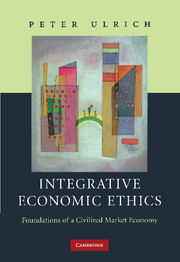Book contents
- Frontmatter
- Contents
- List of figures
- Preface
- Translator's note
- Introduction: orientation in economic-ethical thinking
- Part I Fundamental concepts of modern ethics and the approach of integrative economic ethics
- Part II Reflections on the foundations of economic ethics I: a critique of economism
- Part III Reflections on the foundations of economic ethics II: rational economic activity and the lifeworld
- Part IV A topology of economic ethics: the ‘sites’ of morality in economic life
- Bibliography
- Index of subjects
- Index of names
Part IV - A topology of economic ethics: the ‘sites’ of morality in economic life
Published online by Cambridge University Press: 22 September 2009
- Frontmatter
- Contents
- List of figures
- Preface
- Translator's note
- Introduction: orientation in economic-ethical thinking
- Part I Fundamental concepts of modern ethics and the approach of integrative economic ethics
- Part II Reflections on the foundations of economic ethics I: a critique of economism
- Part III Reflections on the foundations of economic ethics II: rational economic activity and the lifeworld
- Part IV A topology of economic ethics: the ‘sites’ of morality in economic life
- Bibliography
- Index of subjects
- Index of names
Summary
In Chapter 3 we distinguished between three systematic tasks of integrative economic ethics: the critique of economism (a critique of ‘pure’ economic reason and its normative implications), the development of guiding ideas of rational economic activity from the lifeworld perspective (conception of socio-economic rationality) and, finally, the determination of the ‘sites’ of the systematic mediation between moral claims and the functional conditions of the economic system. Parts II and III of this book were devoted to the first two tasks; in this part we turn to the remaining issue of the ‘sites’ or the topology of economic ethics.
On the whole, differences of opinion in economic ethics rest less upon different conceptions of morally correct action than on diverging ideas as to the correct ‘site’ of morality in or with reference to the market economy. Accordingly, the determination of the locations of morality is usually rooted in profound and comprehensive fundamental convictions deriving from economic and social philosophy involving both a clearly defined concept of man and a clearly defined idea of society. The fundamental topological question of economic ethics is ultimately concerned with the relationship between individual ethics and institutional ethics. The former deals with the responsibility for actions as far as it can be directly attributed or ascribed to the individual economic agents, the latter with the institutional points at which ethical ‘landmarks’ – legal norms and (dis-) incentives – can be inscribed into the economic and social order and thus indirectly mediated to the economic agents.
- Type
- Chapter
- Information
- Integrative Economic EthicsFoundations of a Civilized Market Economy, pp. 269 - 272Publisher: Cambridge University PressPrint publication year: 2008



